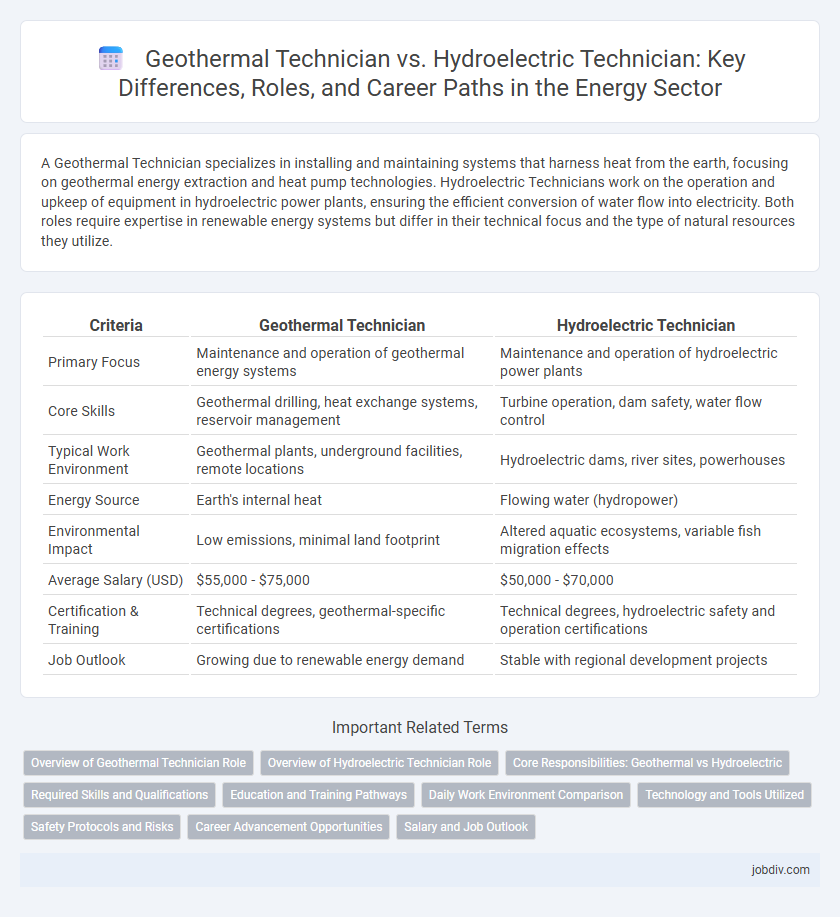A Geothermal Technician specializes in installing and maintaining systems that harness heat from the earth, focusing on geothermal energy extraction and heat pump technologies. Hydroelectric Technicians work on the operation and upkeep of equipment in hydroelectric power plants, ensuring the efficient conversion of water flow into electricity. Both roles require expertise in renewable energy systems but differ in their technical focus and the type of natural resources they utilize.
Table of Comparison
| Criteria | Geothermal Technician | Hydroelectric Technician |
|---|---|---|
| Primary Focus | Maintenance and operation of geothermal energy systems | Maintenance and operation of hydroelectric power plants |
| Core Skills | Geothermal drilling, heat exchange systems, reservoir management | Turbine operation, dam safety, water flow control |
| Typical Work Environment | Geothermal plants, underground facilities, remote locations | Hydroelectric dams, river sites, powerhouses |
| Energy Source | Earth's internal heat | Flowing water (hydropower) |
| Environmental Impact | Low emissions, minimal land footprint | Altered aquatic ecosystems, variable fish migration effects |
| Average Salary (USD) | $55,000 - $75,000 | $50,000 - $70,000 |
| Certification & Training | Technical degrees, geothermal-specific certifications | Technical degrees, hydroelectric safety and operation certifications |
| Job Outlook | Growing due to renewable energy demand | Stable with regional development projects |
Overview of Geothermal Technician Role
Geothermal technicians specialize in installing, maintaining, and repairing systems that harness heat from beneath the Earth's surface to generate sustainable energy. Their role demands expertise in monitoring geothermal wells, managing heat exchange systems, and ensuring compliance with environmental regulations for renewable energy sources. These technicians work closely with engineers to optimize geothermal plant performance, contributing to reduced carbon emissions and efficient energy production.
Overview of Hydroelectric Technician Role
Hydroelectric technicians specialize in maintaining and repairing equipment at hydroelectric power plants, ensuring efficient operation of turbines, generators, and control systems. Their role involves routine inspections, troubleshooting mechanical and electrical issues, and coordinating with engineers to optimize energy output from water flow. These technicians play a critical part in sustaining renewable energy production by maximizing the reliability and safety of hydroelectric infrastructure.
Core Responsibilities: Geothermal vs Hydroelectric
Geothermal technicians specialize in operating and maintaining systems that extract heat from the earth, focusing on wells, heat exchangers, and pumping systems to optimize geothermal energy production. Hydroelectric technicians manage the functionality of hydroelectric power plants, ensuring the efficient operation of turbines, generators, and dam infrastructure to convert water flow into electricity. Both roles require expertise in mechanical systems and energy conversion, but geothermal technicians emphasize subsurface heat extraction while hydroelectric technicians focus on water-based energy generation.
Required Skills and Qualifications
Geothermal technicians require expertise in geothermal systems, including knowledge of drilling, reservoir management, and thermodynamics, alongside skills in mechanical maintenance and electrical troubleshooting. Hydroelectric technicians must be proficient in electrical systems, hydraulic machinery, and turbine maintenance, with qualifications often including experience in fluid mechanics and power generation control systems. Both roles demand strong problem-solving abilities, safety compliance awareness, and technical certifications relevant to renewable energy technologies.
Education and Training Pathways
Geothermal technicians typically require specialized training in geothermal energy systems, often obtained through technical colleges or apprenticeships focusing on earth sciences and mechanical systems. Hydroelectric technicians usually complete programs in electrical or mechanical engineering technology, with hands-on training at hydroelectric plants or utility companies. Both careers emphasize safety certifications and continuing education to stay current with evolving renewable energy technologies.
Daily Work Environment Comparison
Geothermal Technicians often work in remote, high-temperature sites involving subsurface drilling and heat extraction equipment, requiring specialized safety gear and environmental monitoring. Hydroelectric Technicians typically operate within dam facilities or river-based turbines, focusing on water flow regulation, turbine maintenance, and electrical systems in fluctuating moisture conditions. Both roles demand technical proficiency but differ significantly in daily environmental challenges and operational settings.
Technology and Tools Utilized
Geothermal technicians use specialized equipment such as thermal imaging cameras, borehole logging tools, and temperature sensors to monitor and maintain geothermal wells and heat exchange systems. Hydroelectric technicians operate and maintain turbines, generators, and control systems, employing tools like vibration analyzers, ultrasonic flow meters, and electrical diagnostic instruments. Both roles rely on advanced monitoring technology and automated control systems to optimize energy production and ensure system reliability.
Safety Protocols and Risks
Geothermal technicians encounter high-temperature steam and corrosive fluids, requiring stringent safety protocols such as pressure control measures and protective gear to prevent burns and chemical exposure. Hydroelectric technicians manage risks related to water flow pressure, electrical hazards, and confined spaces, emphasizing lockout-tagout procedures and fall protection to avoid electrocution and drowning incidents. Both roles demand rigorous adherence to industry standards and continuous hazard assessment to maintain operational safety in energy production environments.
Career Advancement Opportunities
Geothermal Technicians often advance by specializing in system design or project management within renewable energy companies, leveraging expertise in geothermal resource assessment and drilling technology. Hydroelectric Technicians can progress to roles involving dam operation supervision, maintenance management, or environmental compliance, utilizing knowledge of hydraulic systems and turbine mechanics. Both careers offer pathways into energy consultancy, regulatory roles, or technical training positions, depending on experience and certifications.
Salary and Job Outlook
Geothermal Technicians earn an average annual salary of $54,000, with a job growth rate projected at 8% over the next decade due to increasing renewable energy investments. In comparison, Hydroelectric Technicians typically make around $58,000 per year, supported by steady demand for hydroelectric plant maintenance and upgrades, with job growth estimated at 5%. Both careers offer stable opportunities, but geothermal energy's expanding niche suggests a slightly faster employment increase.
Geothermal Technician vs Hydroelectric Technician Infographic

 jobdiv.com
jobdiv.com